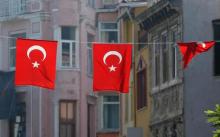Turkish invasion of Cyprus
The US nod to the prodigal son
In the immediate aftermath of Turkey's invasion of Cyprus in 1974, American foreign policy became focused on three areas: a) preventing a war between Greece and Turkey; b) keeping NATO's southern flank intact; and c) averting Soviet involvement. In other areas, it allowed developments to take their own course, so that a new balance of power was created between Greece, Turkey and Cyprus.
- Read more about The US nod to the prodigal son
- Log in to post comments
UN urges rivals in Cyprus to de-escalate tensions, seize opportunity to restart talks
The UN Security Council voted unanimously Tuesday to extend the UN peacekeeping mission in Cyprus for a year and urged all parties including rival Greek Cypriots and Turkish Cypriots to take steps "to de-escalate tensions in and around the buffer zone" dividing the Mediterranean island.
Cyprus offers measures to support estranged Turk Cypriots
Cyprus announced a series of gestures to support estranged Turkish Cypriots on Friday, days before the visit of a United Nations envoy who will assess prospects for the resumption of long-stalled peace talks.
Tribute to the American Hellenic Institute
The year 2024 marks the 50th anniversary of the American Hellenic Institute.
Founded by late Eugene Rossides in 1974 following the Turkish invasion of Cyprus, AHI is specialized on issues related to Cyprus and Greece as key enablers of a principled and interest-based US policy in the region.
- Read more about Tribute to the American Hellenic Institute
- Log in to post comments
Defense minister raises two-state solution in Cyprus dispute
Defense Minister Yaşar Güler has advocated for a two-state solution as the only viable resolution to the longstanding conflict on the divided island of Cyprus.
Kissinger and the arms embargo on Turkey
Henry Kissinger, the former US secretary of state and national security adviser who died on November 29, was a "red flag" for the Greeks and the diaspora, as he was viewed as largely responsible for the attitude that the United States and NATO adopted toward Turkey following its invasion of Cyprus.
- Read more about Kissinger and the arms embargo on Turkey
- Log in to post comments
Henry Kissinger: The controversial, cynical wizard of diplomacy who marked the 20th century is dead
His critics denounce his role in decisions such as the massive US bombing of Cambodia, the invasion of East Timor or the Turkish invasion of Cyprus
The isolation of the regime
According to the conventional interpretation of the events that transpired in 1973-1974, it was not the Polytechnic Uprising that actually precipitated the military dictatorship's downfall but the Turkish invasion of Cyprus eight months later, which was prompted by the overthrow of the Cypriot government of Archbishop Makarios III by Dimitrios Ioannidis' regime in Athens.
- Read more about The isolation of the regime
- Log in to post comments
Greece urges Turkey to adhere to UN resolutions on Cyprus
On the 40th anniversary of the unilateral Turkish Cypriot declaration of independence in the occupied northern part of Cyprus in November 1983, Greece has called on Turkey to adhere to UN resolutions on the ethnically-split Mediterranean island.
Turkish ire at Cyprus over mosque arson attack
Ankara is maintaining a harsh stance in relation to Cyprus, as seen by its reaction to an arson attack on a mosque in Limassol and its posture at the buffer zone in the Pyla area when Turkish Cypriots attacked members of the UN peacekeeping force.
- Read more about Turkish ire at Cyprus over mosque arson attack
- Log in to post comments









